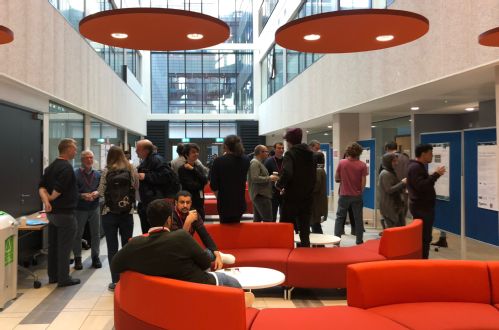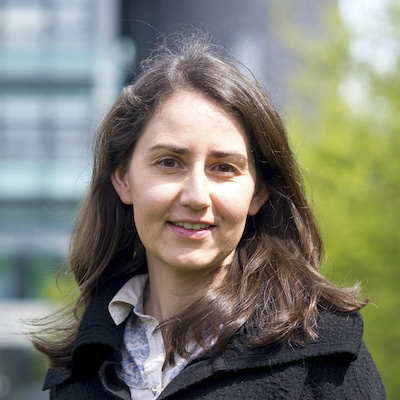Applied Computing News
Promotions for three academic colleagues
 We are delighted to report that Dr Claire Rocks has been promoted to Associate Professor, and that Dr Florin Ciucu and Dr Matthew Leeke have been promoted to Reader, effective from 1 June 2020. Quoting from Matt's recommendation,
We are delighted to report that Dr Claire Rocks has been promoted to Associate Professor, and that Dr Florin Ciucu and Dr Matthew Leeke have been promoted to Reader, effective from 1 June 2020. Quoting from Matt's recommendation,
Dr Leeke has a number of internationally excellent publications, and has contributed to several research grants, the two largest ones being strategic industrial collaborations. … In addition to his sustained teaching excellence in the department, Dr Leeke has led and contributed to a variety of key educational activities at the departmental, faculty and institutional levels.
from Florin's recommendation,
Dr Ciucu’s high esteem by members of his international research community is evidenced by his services in editing leading journals and being on programme committees of highly ranked conferences. … Dr Ciucu is known in the department for the quality of his teaching and high levels of student engagement in his modules, which have included a challenging but central MSc module in data analytics.
and from the recommendation for Claire,
Dr Rocks has been an educational leader in the department as well as nationally, both through her scholarship-led development and delivery of modules (1st-year and 3rd-year undergraduate, and most recently for IATL and Warwick in London), and her contributions in the Academic Studies Committee in Computer Science. … Dr Rocks has built institutional, regional and national reputations through her leadership of outreach and engagement activities. In addition to delivering CPD for teachers with the National Centre for Computing Education, Dr Rocks has played key roles in numerous events including the British Science Festival, the Festival of the Imagination, the Cheltenham Science Festival, and Sutton Trust Summer Schools.
it remains to say many congratulations!
Warwick Postgraduate Colloquium in Computer Science 2019

The 17th Warwick Postgraduate Colloquium in Computer Science (WPCCS) was held on Monday 9 December, in the Mathematical Science Building for the first time. This year’s event saw 78 submissions from postgraduate research students in the Department. The submissions were split across six varied tracks, highlighting the breadth and depth of research currently being conducted by PhD students within the Department.
Student presentations were supplemented with two engaging guest talks from academics in the Department. Torsten Mütze captured everyone's attention with the mathematics behind origami, and Feng Hao enlightened the audience on the encryption challenges behind e-voting. The day concluded with a festive drinks reception, sponsored by the Department’s two Centres for Doctoral Training (CDTs), at which prizes were awarded to the best posters and presentations.
PhD student attendee Jonathan Davies said, “It was very rewarding for me to present at WPCCS this year. It gave me the opportunity to share my research with others and engage in stimulating conversation with my fellow postgraduate colleagues. The guest talks, in particular, were thought-provoking and engaging. I look forward to presenting at WPCCS in the future."
Hakan Ferhatosmanoglu, Director of Postgraduate Research and CS CDT, said, “It was a pleasure to attend WPCCS this year and to celebrate the excellent work that has been undertaken by our PhD students in the past year. It was great to see how everyone was having research discussions and exchanging ideas with each other.”
Prize Winners
- Best Presentation - John Pocock
- Best Poster - Tom Wood
- Best in Computational Biology - John Pocock, Rawan Abulsayli and Hammam Alghamdi
- Best in Theory, Foundations, and Discrete Mathematics - Alex Dixon and Thesjaswini Raghavan
- Best in Computer Security and Networks - Jasmine Grosso and Shin Wan
- Best in Machine Learning and Artificial Intelligence - Tom Wood, Abeer Almowallad, Gabriele Pergola, Haoyi Wang, Junyu Li and Helen McKay
- Best in High Performance Computing and Databases - Richard Kirk and Dean Chester
- Best in Urban Science - Jonathan Davies, Teddy Cunningham, Elisa Baioni, Ivana Tosheva and Shanaka Perera
Dr Maria Liakata receives a Turing Artificial Intelligence (AI) Fellowship

We are please to report that Dr Maria Liakata has received a Turing Artificial Intelligence (AI) Fellowship.
The Fellowships from The Alan Turing Institute, the UK’s national institute for data science and AI, aim to attract and retain exceptional researchers in artificial intelligence. Covering a broad view of AI, including applications of foundational disciplines across mathematical sciences, statistical sciences, computational sciences and engineering, Fellows collaborate across disciplines and have the opportunity to collaborate with academia, industry, government and the third sector.
Dr Liakata’s Fellowship will focus on creating time sensitive sensors from language and heterogeneous user generated content. Commenting on the research she said:
“Wide spread use of digital technology has made it possible to obtain language data (e.g., social media, SMS) as well as heterogeneous data (e.g., mobile phone use, sensors) from users over time. Such data can provide useful behavioural cues both at the level of the individual and the wider population, enabling the creation of longitudinal digital phenotypes.
“Current methods in natural language processing (NLP) are not well suited to time sensitive, sparse and missing data, collected over time or personalised models of language use. The Turing AI fellowship will allow me to establish a new area in NLP on personalised longitudinal language processing.
“I plan to develop sensors for capturing digital biomarkers from language and heterogeneous user generated content to understand the evolution of an individual over time. I want to make a significant contribution to mental health by working with clinical experts to create new tools based on the sensors, making it possible to assess and measure conditions in between clinician appointments.”
To read more on this story, please click here.
